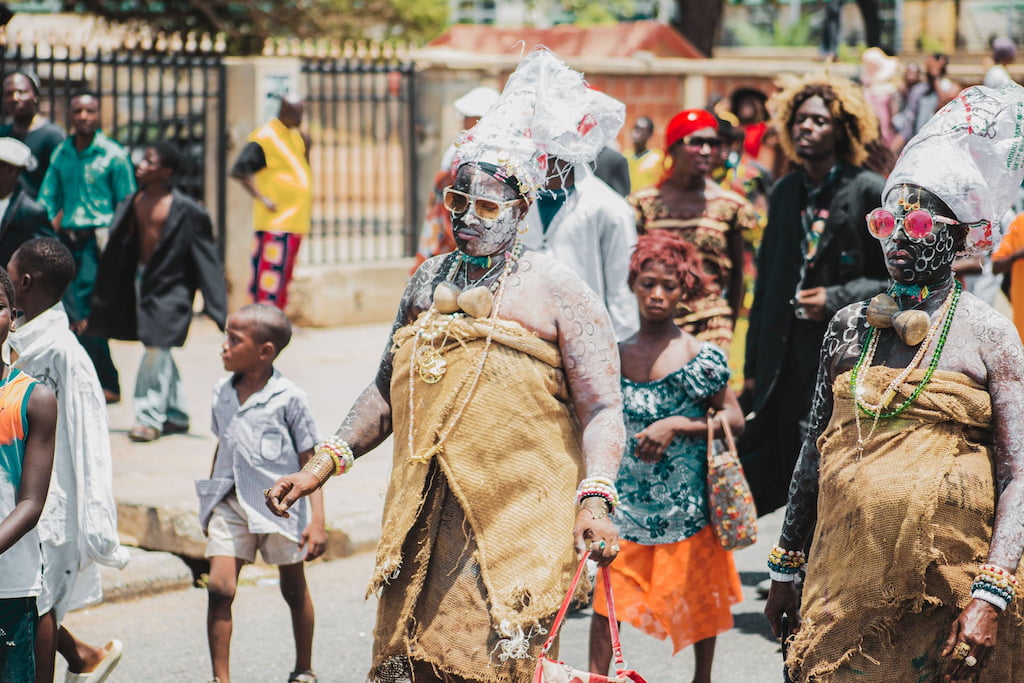By Sewa Fabikun
In the contemporary society, the concept of culture shock isn’t new. Essentially, culture shock refers to the sense of anxiety, confusion, or frustration people typically experience when they are faced with the realities of an entirely new, foreign, or unfamiliar cultural setting. Using two African countries, Nigeria and Ghana, we will discover the similarities and differences of the unique experiences they share, two neighboring countries that share a common heritage but distinctive traditions.
In African diaspora, Nigeria and Ghana stand as the two well-known countries with deep-rooted, historical cultures. Despite the location and shared colonial histories being colonized by the British, Ghana gained independence first in 1957 followed by Nigeria in 1960.

The Culture
Nigeria and Ghana both have rich histories and are marked by their unique customs and traditions. The Nigerian culture, is largely influenced by its three popular ethnic groups namely: Hausa, Igbo, Yoruba, this languages are diverse, complex, and vibrant. Nigeria exhibits a multi-faceted variety of traditions, languages, and rituals, with over 520 distinct dialects as evidence of where the person is from. However, Ghana, which is made up of the ethnic groups of Akan, Mole-Dagbon, Ewe, and Ga-Dangme, they maintain the traditions and practices that give the people of the community a sense of identity and belonging. Twi is the most widely spoken and understood language in the country, with English which is also the official language comes in second. Notwithstanding these cultural differences, there are common traits that unite the cultures of Ghana and Nigeria which is their shared African moral values, it includes the tendency for a coordinated life and a strong focus on family relationships, respect for elders and the warmth of hospitality instantly makes visitors feel at ease.
The Cultural Shock
Misunderstandings and cultural shocks can occur in the use and interpretation of these common goals. For instance, an average Nigerian might find the living with people less prominent in Ghana, thus the potential shock. This could be revolved around the different perspectives in communal living. While in Nigeria, it is typically considered collective to live together in a big family compounds and share resources; that may not be the case in Ghana. In essence, cultural shock might not prevent what is practiced but how it is practiced.
When it comes to culture shock, Nigeria and Ghana share several similarities. Both countries boast of rich cultural heritages, traditional practices, and rich local cuisines. The vibrant marketplaces, bustling streets, and warm hospitality are found in abundance. Also the prominent influence of religion, particularly Christianity in Nigeria and both Christianity and Islam in Ghana, shapes the daily lives of the people. The respect for elders, strong family values, and the importance placed on community harmony are fundamental aspects of both Nigerian and Ghanaian cultures.
Furthermore, the differences in the use of language across the two countries could initiate culture shock. Although both Nigeria and Ghana have English as the official language, the difference comes with the variance in accent, intonation, and the informal usage which might show understanding difficulties for visitors transitioning between these countries. The social norms in both countries is paramount, they value the respect for elders. Nigerians place significant importance on titles and greetings while the Ghanaians use different hand gestures as a sign of respect.
Moreover, although not entirely negative, culinary differences between Nigerian and Ghanaian cuisine could cause mild culture shock. The popular Jollof rice dish has often been a bone of contention between these two countries. Visitors on either side are caught by surprise with the taste and preparation style of what they considered a familiar meal. Nigerian jollof rice is known for its fiery flavors and spicy taste as well as other Nigerian dishes, in contrast, the Ghanaian cuisines tend to be milder in taste especially the jollof rice and other foods like fufu, banku often accompanied with their stews or soups.
However, despite what these countries share in common, travelers always realize the subtle differences that make each country distinct. Nigeria’s bustling cities and wild nightlife present a unique experience, while Ghana’s serene beaches and captivating cuisines offer a different perspective.
Conclusion
Nigeria and Ghana have numerous similarities, also subtle cultural differences coming from their customs, languages, and food. It underlines the beauty of Africa’s diverse culture, highlighting the uniqueness and individual characteristics that each African country possesses. Immersing oneself into a new culture, after all, is about understanding, acceptance, and respect for these cultural differences, which ultimately promotes unity across boarders. So, whether you find yourself fascinated by Nigeria’s energetic urban lifestyle or captivated by Ghana’s tranquil environment, exploring these neighboring countries will certainly introduce you to a world of cultural magic. Pack your bags, brace yourself for cultural adventures, and prepare for the exciting experiences that await you in Nigeria and Ghana!




